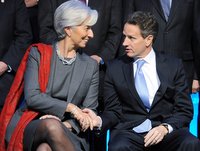Registration
Thank you!
You will receive an email confirming your registration.
IMGXYZ3589IMGZYXFormer U.S. Deputy Assistant Secretary of the Treasury Nova Daly gave a talk about the global economic environment and its impact on the United States. The event was held at the American Chamber of Commerce and was co-hosted by the Carnegie-Tsinghua Center. CTC Director Paul Haenle moderated the discussion.
Complications in the Global Economy
- The Eurozone: At this moment Europe is in a tenuous position, particularly since many analysts think that stimulus policies introduced in Europe are too favorable to the banking sector, Daly said. He added that while the EU central bank hopes to bail out Greece and other ailing countries, there is also talk of China buying this debt.
- China: Although China is doing well and maintaining a 9 percent growth rate, inflation is a problem. Daly added that, given how China depends on selling manufactured goods to developed countries currently experiencing economic downturns, the Chinese economy will inevitably be affected by the global recession.
The U.S. Economy
- Another Possible Economic Recession: Presently, many economic analysts in the United States believe that the country may see another recession in the first and second quarters of next year, Daly said. U.S. unemployment is hovering around 9 percent and income disparity continues to increase.
- Foreign Investment: Historically, the United States does not have a huge trade dependency, but it is the recipient of significant foreign investment—foreign firms provide 4.7 percent of U.S. jobs, Daly said.
- Enhancing Competitiveness: Since the emerging BRICS economies are weathering the economic storm comparatively better than the more mature economies of Western Europe, the United States is turning its attention toward middle income countries and has launched initiatives to make the United States more competitive, Daly said. However, manufacturing sectors in the United States have been badly hit by both the recession and by cheaper manufacturing and labor costs abroad.
- China Should Increase Investment: Overall, China has around 10 billion USD of stock in the United States, while the United States has over 50 billion USD worth of stock in China, Daly said. As a result, there is a lot of room for increase on the Chinese side, especially since China has 3 trillion USD in currency reserves.
- China’s Outward Investment: Relative to its economic size, China actually has very low levels of outward investment. This will likely increase as China’s (already high) demand for oil, minerals, and other natural resources increases, Daly said. Demand for these resources has encouraged Beijing to invest in Australia, Africa, and the Middle East, sometimes resulting in controversy. To avoid further controversy, Daly suggested that China could invest in the U.S. manufacturing sector, which would provide much needed jobs in a sector that has been badly hit by the economic crisis.
Impediments to Trade and Investment
- Chinese Intellectual Property Rights (IPR) Violations: Protection of IPR is crucial for innovation and to making lengthy and costly research and development processes worthwhile, Daly asserted. As a world leader in innovation, high technology, and industry, the United States loses out more than other countries when IP regulation is not well enforced. This is particularly a problem in China. In 2009, the U.S. International Trade Commission estimated that U.S. businesses lost 48.2 billion USD due to IP theft and that there would be approximately 2.1 million more jobs in the United States if IPR were enforced to the same degree in China as they are in the United States.
- China’s State Owned Enterprises: China’s state-owned enterprises (SOEs) represent about 51 percent of China’s economy, while 50 percent of China’s investment abroad is made by its SOEs, Daly said. The U.S. business and manufacturing sectors are concerned about the impact that this will have on the U.S. economy. There is concern in the United States that Chinese SOEs receive targeted funding and allowances from the Chinese government to put them at an advantage when competing with private enterprises to invest overseas. Washington also has national concerns when dealing with a firm that has access to U.S. governmental resources. The U.S. government hopes that China will sign on to the WTO Agreement on Government Procurement (GPA) to put its SOEs on a more level playing field, Daly concluded.
- China’s Opaque Investment and Legal Framework: Restrictive investment policies and a non-transparent legal framework for investment put a lot of roadblocks in the way of U.S. businesses operating in China, Daly explained. This will impact the Chinese economy in the long-term as it will discourage foreign businesses from investing in China.
- China’s Currency: The belief that China’s currency is undervalued is not restricted to the United States and EU, Daly said. Developing countries are also accusing China of undervaluing the renminbi (RMB). Brazil, for example, believes that by keeping the RMB so low, Brazilian manufactured goods and exports are made more expensive by comparison, with a negative impact on the Brazilian economy.
